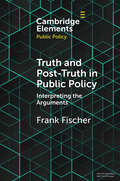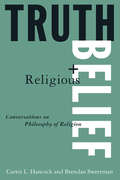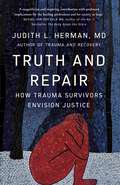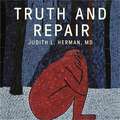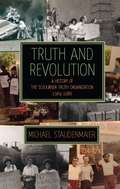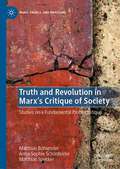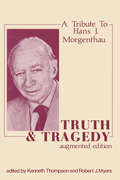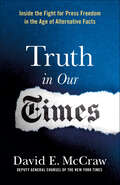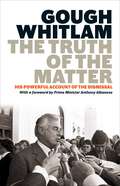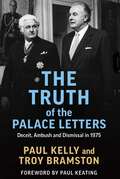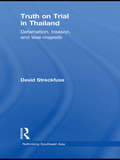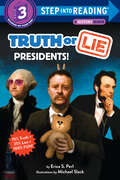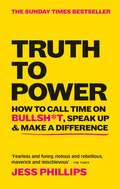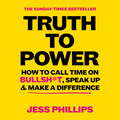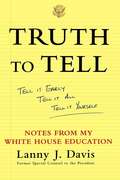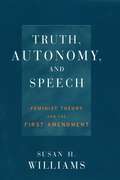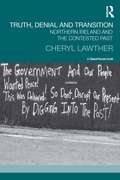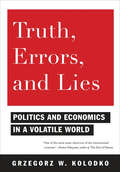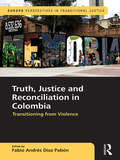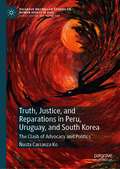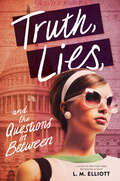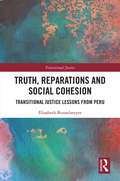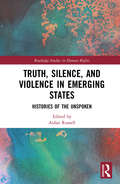- Table View
- List View
Truth and Post-Truth in Public Policy (Elements in Public Policy)
by Frank FischerThe phenomenon of post-truth poses a problem for the public policy-oriented sciences, including policy analysis. Along with “fake news,” the post-truth denial of facts constitutes a major concern for numerous policy fields. Whereas a standard response is to call for more and better factual information, this Element shows that the effort to understand this phenomenon has to go beyond the emphasis on facts to include an understanding of the social meanings that get attached to facts in the political world of public policy. The challenge is thus seen to be as much about a politics of meaning as it is about epistemology. The analysis here supplements the examination of facts with an interpretive policy-analytic approach to gain a fuller understanding of post-truth. The importance of the interpretive perspective is illustrated by examining the policy arguments that have shaped policy controversies related to climate change and coronavirus denial.
Truth and Religious Belief: Philosophical Reflections on Philosophy of Religion
by Randolph Feezell Brendan Sweetman Curtis L. HancockThis book contains a thorough and balanced series of dialogues introducing key topics in philosophy of religion, such as: the existence and nature of God, the problem of evil, religious pluralism, the nature of religious experience, immortality, and the meaning of life. A realistic cast of characters in a natural setting engages in a series of thought-provoking conversations; the dialogue format of these conversations captures typical student attitudes and questions concerning religious belief; allows comparison of important themes throughout the dialogues; encourages the interjection of insights, observations, questions, and objections; and introduces related points when they would naturally arise, instead of relegating them to a later chapter. As well as presenting a detailed and probing discussion, each dialogue includes a list of key terms, a set of study questions, and a bibliography - all of which make this an excellent text for courses in philosophy of religion and introductory philosophy classes.
Truth and Repair: How Trauma Survivors Envision Justice
by Judith Herman'A magnificent and inspiring contribution with profound implications' Bessel van der Kolk MD, author of The Body Keeps the Score'Celebrates survivors' wisdom and their power to heal themselves and the world we live in' Anita HillA powerful manifesto for reimagining justice, based on the testimony of trauma survivors. The #MeToo movement brought worldwide attention to sexual violence, but while the media focused on the fates of a few notorious predators who were put on trial, we heard far less about the outcomes of those trials for the survivors of their abuse. The conventional retributive process fails to serve most survivors because it was never designed for them. Renowned trauma expert Judith L. Herman argues that the first step toward a better form of justice is simply to ask survivors what would make things as right as possible for them. In Truth and Repair, she commits the radical act of listening to survivors. Recounting their stories, she offers an alternative vision of justice as healing for survivors and their communities. Deeply researched and compassionately told, Truth and Repair envisions a new path to justice for all.
Truth and Repair: How Trauma Survivors Envision Justice
by Judith HermanA powerful exploration of what justice truly means for survivors of sexual violence, abuse, and trauma.Part manifesto, part exploration of what justice truly means for survivors of trauma and abuse, Judith Herman forces us to reconsider our perspective on victims, revealing uncomfortable truths about our justice systems and proposing new ways to implement justice. A follow-up to the bestselling Trauma and Recovery the audiobook is divided into three parts, Part One: Power, examines the structure and nature of tyranny, patriarchy and white supremacy; Part Two: Visions of Justice, reveals how our current system is woefully ill-equipped for victims and corrects our misguided assumptions about what survivors need in the aftermath of violence, and finally in Part Three: Centring Survivor Justice, Herman proposes alternative methods of justice, offering hopeful new ways to think about its meanings and possibilities.Truth and Repair is a profound and timely commentary that lies at the intersection of several cultural moments including the #MeToo movement, a resurgent interest in trauma, and the global movements focusing on racial injustices and abuses of power towards people of colour. Thoughtful, visceral and moving, Truth and Repair is a necessary call to action that invites us to envision a new approach to justice-one that centres on healing and solidarity to stand with survivors everywhere.(P) 2023 Hachette Audio
Truth and Revolution
by Michael Staudenmaier John H. Bracey Jr.Founded in Chicago in 1969 from the rubble of the recently crumbled SDS, the Sojourner Truth Organization (STO) brought working-class consciousness to the forefront of New Left discourse, sending radicals back into the factories and thinking through the integration of radical politics into everyday realities. Through the influence of founding members like Noel Ignatiev and Don Hamerquist, STO took a Marxist approach to the question of race and revolution, exploring the notion of "white skin privilege," and helping to lay the groundwork for the discipline of critical race studies. Michael Staudenmaier is a doctoral candidate in history at the University of Illinois-Urbana.
Truth and Revolution in Marx's Critique of Society: Studies on a Fundamental Problematique (Marx, Engels, and Marxisms)
by Matthias Bohlender Anna-Sophie Schönfelder Matthias SpekkerThis book deals with a central aspect of Marx’s critique of society that is usually not examined further since it is taken as a matter of course: its scientific claim of being true. But what concept of truth underlies his way of reasoning which attempts to comprehend the social and political circumstances in terms of the possibility of their practical upheaval? In three studies focusing specifically on the development of Marx’s scientific critique of capitalist society, his journalistic commentaries on European politics, and his reflections on the organisation of revolutionary subjectivity, the authors carve out the immanent relation between the scientifically substantiated claim to truth and the revolutionary perspective in Marxʼs writings. They argue that Marx does not grasp the world ‘as it is’ but conceives it as an inverted state which cannot remain what it is but generates the means by which it can eventually be overcome. This is not something to be taken lightly: Such a concept has theoretical, political and even violent consequences—consequences that nevertheless derive neither from a subjective error nor a contamination of an otherwise ‘pure’ science. By analyzing Marx’s concept of truth the authors also attempt to shed light on a pivotal problematique of any modern critique of society that raises a reasoned claim of being true.
Truth and Tragedy: Tribute to Hans J. Morgenthau
by Kenneth ThompsonFeaturing a new fifty-page interview with Hans J. Morgenthau by Bernard Johnson, this volume on the renowed scholar and philosopher demonstrates how pervasive is his mark on the study of international relations and political philosophy. The interview illuminates Morgenthau's intellectual development in Europe between the world wars and in the United States. It is in recognition of his unsurpassed contribution to the field of international relations and political philosophy that this collection of contributions from distinguished scholars has been assembled. The continuation and refinement of his work in this book prove the lasting value of his philosophical truths in the understanding of human nature, the role of power at all levels of society, and his concept of national interest.
Truth in Our Times: Inside the Fight for Press Freedom in the Age of Alternative Facts
by David E. McCrawDavid E. McCraw recounts his experiences as the top newsroom lawyer for the New York Times during the most turbulent era for journalism in generations.In October 2016, when Donald Trump's lawyer demanded that The New York Times retract an article focused on two women that accused Trump of touching them inappropriately, David McCraw's scathing letter of refusal went viral and he became a hero of press freedom everywhere. But as you'll see in Truth in Our Times, for the top newsroom lawyer at the paper of record, it was just another day at the office.McCraw has worked at the Times since 2002, leading the paper's fight for freedom of information, defending it against libel suits, and providing legal counsel to the reporters breaking the biggest stories of the year. In short: if you've read a controversial story in the paper since the Bush administration, it went across his desk first. From Chelsea Manning's leaks to Trump's tax returns, McCraw is at the center of the paper's decisions about what news is fit to print.In Truth in Our Times, McCraw recounts the hard legal decisions behind the most impactful stories of the last decade with candor and style. The book is simultaneously a rare peek behind the curtain of the celebrated organization, a love letter to freedom of the press, and a decisive rebuttal of Trump's fake news slur through a series of hard cases. It is an absolute must-have for any dedicated reader of The New York Times.
Truth of the Matter: His powerful account of the Dismissal
by Gough WhitlamPassionate, pithy, learned, witty, and vigorously combative, The Truth of the Matter tells the extraordinary political story of the only Prime Minister of Australia ever deposed from office. On Remembrance Day 1975 the Governor-General of Australia, Sir John Kerr, sacked Prime Minister Gough Whitlam. The Dismissal was the culmination of almost three years of political conflict, as Whitlam's progressive Labor government rammed home legislative reform in the face of implacable and increasingly bitter conservative resistance. The focus of the Opposition's scheming was the Senate, where its leaders blocked supply in order to force a political crisis. Whitlam, famous for his 'crash through or crash' style, refused to compromise with his political enemies. At an election a month after the Dismissal, the conservatives were returned to office. Controversy and recrimination followed. Many Australians, including Whitlam himself, believed he had been the victim of a coup. In 1979 Whitlam published his own account of the events of 1975, The Truth of the Matter, an instant bestseller.
Truth of the Palace Letters: Deceit, Ambush and Dismissal in 1975
by Paul Kelly Troy BramstonIn July 2020 the National Archives of Australia released the long-suppressed correspondence between Sir John Kerr and Queen Elizabeth II, written during Kerr's tumultuous tenure as Governor-General of Australia. The letters cover the constitutional crisis that culminated in Kerr's infamous dismissal of Labor Prime Minister Gough Whitlam in 1975. In The Truth of the Palace Letters Paul Kelly and Troy Bramston reveal their meaning and significance for understanding the dismissal. The analysis of these documents and their authors throws a revealing light on the connection between the Queen in Buckingham Palace and the Governor-General in Canberra. Coupled with newly discovered archival documents and interviews, Kelly and Bramston explain the implications of the letters for our Constitution, our democracy and the republic debate.
Truth on Trial in Thailand: Defamation, Treason, and Lèse-Majesté (Rethinking Southeast Asia)
by David StreckfussSince 2005, Thailand has been in crisis, with unprecedented political instability and the worst political violence seen in the country in decades. In the aftermath of a military coup in 2006, Thailand’s press freedom ranking plunged, while arrests for lèse-majesté have skyrocketed to levels unknown in the modern world. Truth on Trial in Thailand traces the 110-year trajectory of defamation-based laws in Thailand. The most prominent of these is lèse-majesté, but defamation aspects also appear in laws on sedition and treason, the press and cinema, anti-communism, contempt of court, insulting of religion, as well as libel. This book makes the case that despite the appearance of growing democratization, authoritarian structures and urges still drive politics in Thailand; the long-term effects of defamation law adjudication has skewed the way that Thai society approaches and perceives "truth." Employing the work of Habermas, Foucault, Agamben, and Schmitt to construct an alternative framework to understand Thai history, Streckfuss contends that Thai history has become "suspended" since 1958, and repeatedly declining to face the truth of history has set the stage for an endless state of crisis. This book will be of interest to students and scholars of South East Asian politics, Asian history, and media and communication. David Streckfuss is an independent scholar who has lived in Thailand for more than 20 years. His work primarily concerns human rights, and political and cultural history.
Truth or Lie: Presidents! (Step into Reading)
by Erica S. PerlJust in time for Presidents' Day and the 2020 election! Proficient readers will enjoy hunting down the TRUTH about several of our U.S. presidents in this book, part of an innovative new series.President William Howard Taft, the twenty-seventh president of the United States, got stuck in the White House bathtub, right? That's a LIE! The TRUTH is, he never actually got stuck in the bath during his presidency, but he did go on to become a Supreme Court chief justice after his term. Though 100% fun, 25% of this engaging early reader is FALSE! In a unique question-and-answer format, proficient readers are quizzed about funny, interesting presidential trivia, to see if they can separate facts from "lies." Our mascot--the Truth Sleuth--guides readers through this entertaining and fact-packed Step 3 book, filled with historical photos and kid-appealing art and humor. Step 3 Readers feature engaging characters in easy-to-follow plots about popular topics for children who are ready to read on their own.
Truth to Power: How to Call Time on Bullsh*t, Speak Up & Make A Difference (The Sunday Times Bestseller)
by Jess Phillips'There's nobody else at Westminster quite like Jess Phillips. She is fearless and funny, riotous and rebellious, maverick and mischievous.' The Times'Jess Phillips is a heroine' J.K. Rowling This is a very powerful little book.It offers inspiration to those of us who want to speak out at a time when many of us feel the world isn't listening.Jess Phillips - no stranger to speaking truth to power herself - will help you dig deep and get organised, finding the courage and the tools you need to speak up and make a difference.As well as offering inspiration and hope from her own experiences Jess talks to the accidental heroes who have been brave enough to risk everything, become whistle-blowers and successfully fight back. Entertaining, empowering and uncompromising, TRUTH TO POWER is the little book we all need to help us call time on the seemingly unstoppable tide of bullshit in our lives.
Truth to Power: How to Call Time on Bullsh*t, Speak Up & Make A Difference (The Sunday Times Bestseller)
by Jess PhillipsTHE SUNDAY TIMES BEST SELLER'Will ruffle some feathers.' Stylist'There's nobody else at Westminster quite like Jess Phillips. She is fearless and funny, riotous and rebellious, maverick and mischievous.' The Times'Jess Phillips is a heroine' J.K. Rowling 'Truth to Power treats politics as what we need to remember it is: the solving of problems in people's lives, which one attempts by coming up with a plan and working with everyone. The purpose of the book is to show readers how they can change things too. I've been at events where she's been the surprise guest, and the audience jumped to their feet and whooped like Chrissie Hynde had come on stage to play Brass in Pocket, because someone like Jess Phillips in politics does a powerful thing. It makes millions of women like her think, "If she can do politics, maybe I could do politics too."' Caitlin MoranYOU HAVE MORE POWER THAN YOU THINK.At a time when many of us feel the world isn't listening, Jess Phillips offers inspiration to those of us who want to speak out and make a difference.No stranger to speaking truth to power herself, she will help you dig deep and get organised, finding the courage and the tools you need to take action.As well as bringing us hope through her own experiences Jess talks to the accidental heroes who have been brave enough to risk everything, become whistle-blowers and successfully fight back. Zelda Perkins, the personal assistant who first called-out Harvey Weinstein;Paul Caruana Galizia, son of murdered Maltese journalist Daphne Caruana Galizia;Tom Watson the British MP who successfully took on the Murdoch press empire and won;Sara Rowbotham, the sexual-health worker who uncovered the abuse of young girls by gangs of Asian men in Rochdale - and the subsequent cover-up by the authorities;Natasha Elcock, resident of Grenfell Tower and chair of Grenfell United, the pressure group set up by families after the disaster;Cara Sanquest from the campaign to legalise women's right to choose abortion in Ireland.Entertaining, empowering and uncompromising, TRUTH TO POWER is the book we all need to help us call time on the seemingly unstoppable tide of bullshit in our lives.
Truth to Power: How to Call Time on Bullsh*t, Speak Up and Change The World (The Sunday Times Bestseller)
by Jess Phillips*THE SUNDAY TIMES BEST SELLER'Will ruffle some feathers.' Stylist'There's nobody else at Westminster quite like Jess Phillips. She is fearless and funny, riotous and rebellious, maverick and mischievous.' The Times'Jess Phillips is a heroine' J.K. Rowling YOU HAVE MORE POWER THAN YOU THINK.At a time when many of us feel the world isn't listening, Jess Phillips offers inspiration to those of us who want to speak out and make a difference.No stranger to speaking truth to power herself, she will help you dig deep and get organised, finding the courage and the tools you need to take action.As well as bringing us hope through her own experiences Jess talks to the accidental heroes who have been brave enough to risk everything, become whistle-blowers and successfully fight back. Entertaining, empowering and uncompromising, TRUTH TO POWER is the book we all need to help us call time on the seemingly unstoppable tide of bullshit in our lives.(p) 2019 Octopus Publishing Group
Truth to Tell
by Lanny J. DavisOn a November afternoon in 1996, Lanny Davis got a phone call that would change his life. It was from a top aide at the White House, asking him if he was interested in joining the president's senior staff. Within a few short weeks he had signed on as special counsel to the president. Fourteen months later, his tour of duty almost over, he got another phone call, this time from a Washington Post reporter who asked, "Have you ever heard the name Monica Lewinsky?" In the time between those two phone calls, Davis received an extraordinary political education. As President Bill Clinton's chief spokesman for handling "scandal matters" he had the unenviable job of briefing reporters and answering their pointed questions on the most embarrassing allegations against the president and his aides, from charges of renting out the Lincoln Bedroom, to stories of selling plots in Arlington Cemetery, from irregular campaign fundraising to sexual improprieties. He was the White House's first line of defense against the press corps and the reporters' first point of entry to an increasingly reticent administration. His delicate task was to remain credible to both sides while surviving the inevitable crossfire. Upon entering the White House, Davis discovered that he was never going to be able to turn bad news into good news, but he could place the bad news in its proper context and work with reporters to present a fuller picture. While some in the White House grew increasingly leery of helping a press corps that they regarded as hostile, Davis moved in the opposite direction, pitching unfavorable stories to reporters and helping them garner the facts to write those stories accurately. Most surprisingly of all, he realized that to do his job properly, he sometimes had to turn himself into a reporter within the White House, interviewing his colleagues and ferreting out information. Along the way, he learned the true lessons of why politicians, lawyers, and reporters so often act at cross-purposes and gained some remarkable and counterintuitive insights into why this need not be the case. Searching out the facts wherever he could find them, even if he had to proceed covertly, Davis discovered that he could simultaneously help the reporters do their jobs and not put the president in legal or political jeopardy. With refreshing candor, Davis admits his own mistakes and reveals those instances where he dug a deeper hole for himself by denying the obvious and obfuscating the truth. And in a powerful reassessment of the scandal that led to the president's impeachment, Davis suggests that if the White House had been more receptive to these same hard-won lessons, the Monica Lewinsky story might not have come so close to bringing down an otherwise popular president. For as Davis learned above all, you can always make a bad story better by telling it early, telling it all, and telling it yourself.
Truth, Autonomy, and Speech: Feminist Theory and the First Amendment (Critical America #18)
by Susan WilliamsChoice Magazine Outstanding Academic Titles 2005 WinnerAmidst the vast array of literature on the First Amendment, it is rare to hear a fresh voice speak about the First Amendment, but in Truth, Autonomy, and Speech, Susan H. Williams presents a strikingly original interpretation and defense of the First Amendment, written from a feminist perspective. Drawing on work from several disciplines—including law, political theory, philosophy, and anthropology—the book develops alternative accounts of truth and autonomy as the foundations for freedom of expression. Building on feminist understandings of self and the social world, Williams argues that both truth and autonomy are fundamentally relational. With great clarity and insight, Williams demonstrates that speech is the means by which we create rather than discover truth and the primary mechanism through which we tell the stories that constitute our autonomy. She examines several controversial issues in the law of free speech—including campaign finance reform, the public forum doctrine, and symbolic speech—and concludes that the legal doctrine through which we interpret and apply the First Amendment should be organized to protect speech that serves the purposes of truth and autonomy.
Truth, Denial and Transition: Northern Ireland and the Contested Past
by Cheryl LawtherTruth, Denial and Transition: Northern Ireland and the Contested Past makes a unique and timely contribution to the transitional justice field. In contrast to the focus on truth and those societies where truth recovery has been central to dealing with the aftermath of human rights violations, comparatively little scholarly attention has been paid to those jurisdictions whose transition from violent conflict has been marked by the absence or rejection of a formal truth process. This book draws upon the case study of Northern Ireland, where, despite a lengthy debate, the question of establishing a formal truth recovery process remains hotly contested. The strongest and most vocal opposition has been from unionist political elites, loyalist ex-combatants and members of the security forces. Based on empirical research, their opposition is unpicked and interrogated at length throughout this book. Critically exploring notions of national imagination and blamelessness, the politics of victimhood and the tension between traditions of sacrifice and the fear of betrayal, this book is the first substantive effort to concentrate on the opponents of truth recovery rather than its advocates. This book will interest those studying truth processes and transitional justice in the fields of Law, Politics, and Criminology.
Truth, Errors, and Lies: Politics and Economics in a Volatile World
by Grzegorz KolodkoGrzegorz W. Kolodko, one of the world's leading authorities on economics and development policy and a key architect of Poland's successful economic reforms, applies his far-reaching knowledge to the past and future of the world economy, introducing a framework for understanding our global situation that transcends any single discipline or paradigm.Deploying a novel mix of scientific evaluation and personal observation, Kolodko begins with a brief discussion of misinformation and its perpetuation in economics and politics. He criticizes the simplification of complex economic and social issues and investigates the link between developments in the global economy and cultural change, scientific discoveries, and political fluctuations. Underscoring the necessity of conceptual and theoretical innovation in understanding our global economic situation, Kolodko offers a provocative study of globalization and the possibility of coming out ahead in an era of worldwide interdependence. Deeply critical of neoliberalism, which sought to transfer economic control exclusively to the private sector, Kolodko explores the virtues of social-economic development and the new rules of the economic game. He concludes with a look at our near and distant future, questioning whether we have a say in its making.
Truth, Errors, and Lies: Politics and Economics in a Volatile World
by Grzegorz W. KolodkoAn approach to the challenges of globalism that rejects simplistic solutions, from &“one of the most acute observers of the international economy&” (Francis Fukuyama, New York Times-bestselling author of Identity). Deploying a novel mix of scientific evaluation and personal observation, Grzegorz W. Kolodko, one of the world&’s leading authorities on economics and development policy, begins Truth, Errors, and Lies with a brief discussion of misinformation and its perpetuation in economics and politics. He criticizes the simplification of complex economic and social issues and investigates the link between developments in the global economy and cultural change, scientific discoveries, and political fluctuations. Kolodko, who was a key architect of Poland&’s successful reforms, offers a provocative study of globalization and the possibility of coming out ahead in an era of worldwide interdependence. Deeply critical of neoliberalism, which sought to transfer economic control exclusively to the private sector, Kolodko explores the virtues of social-economic development and the new rules of the economic game. He concludes with a look at our near and distant future, questioning whether we have a say in its making. &“One of the heavyweight economic thinkers of post-communist Europe.&”—The Economist Nominated for the Michael Harrington Book Award
Truth, Justice and Reconciliation in Colombia: Transitioning from Violence (Europa Perspectives in Transitional Justice)
by Fabio Andres Diaz PabonThe signing of the peace agreements between the FARC-EP and the Colombian Government in late November 2016 has generated new prospects for peace in Colombia, opening the possibility of redressing the harm inflicted on Colombians by Colombians. Talking about peace and transitional justice requires us to think about how to operationalize peace agreements to promote justice and coexistence for peace. This volume brings together reflections by Colombian academics and practitioners alongside pieces provided by researchers and practitioners in other countries where transitional justice initiatives have taken place (Bosnia and Herzegovina, South Africa, Sri Lanka and Peru). This volume has been written in the south, by the south, for the south. The book engages with the challenges ahead for the coming generations of Colombians. Rivers of ink have dealt with the end goals of transitional justice, but victims require us to take the quest for human rights beyond the normative realm of theorizing justice and into the practical realm of engaging how to implement justice initiatives. The tension between theory—the legislative frameworks guaranteeing human rights—and practice—the realization of these ideas—will frame Colombia’s success (or failure) in consolidating the implementation of the peace agreements with the FARC-EP.
Truth, Justice, and Reparations in Peru, Uruguay, and South Korea: The Clash of Advocacy and Politics (Palgrave Macmillan Studies on Human Rights in Asia)
by Ñusta Carranza KoThis book presents the first cross-regional analysis of post-transitional justice periods and the conditions that influence states’ behaviors. Specifically, the book examines why states that adopt and ostensibly implement transitional justice norms as policies—criminal prosecutions, reparations policies, and truth commissions—fail to follow through with their recommendations. Applying these perspectives to a comparative study of states from Latin America and East Asia—namely, Peru, Uruguay, and South Korea—which accepted and implemented transitional justice norms but took different trajectories of behavior after the implementation of policies, this book contributes to understanding the relationship of norm influence on states and why states change in compliance after norm adoption. The book explores the conditions that contribute or limit the continued respect for transitional justice norms, emphasizing the political interests and transnational advocacy networks’ roles in affecting states’ policies of addressing past abuses.
Truth, Lies, and the Questions in Between
by L. M. ElliottAs a presidency unravels and the fight for women&’s rights intensifies, a teen girl&’s future will be determined by her willingness to seek the truth, in this stunning work of historical fiction perfect for fans of Monica Hesse and Malinda Lo. Patty Appleton is making history. As one of the Senate&’s first female Congressional Pages, she&’s not only paving the way for other politically minded girls, she has a front-row seat to debates dividing the nation, especially around women&’s rights and roles. The battle between the old ways and the new polarizes the women in Patty&’s life, and she finds herself torn between traditional expectations—to be anobedient daughter aspiring to become a perfect wife—and questions new friends like fiercely feminist Simone encourage her to ask. But the questions don&’t stop at women&’s rights: The Watergate scandal is intensifying. As evidence mounts that the White House engaged in crimes, smears, and cover-ups to manipulate an election, Patty worries her dad, a fundraiser for President Nixon, could somehow be involved. Determining truth from lies becomes ever more essential for the nation&’s future—and for Patty&’s as well. Illustrated throughout with remarkable real-life images and headlines, this timely exploration of 1973—the year of Watergate hearings, the Equal Rights Amendment, and Roe v. Wade—unfolds through the story of a young woman driven to question everything as she learns to think for, and rely on, herself.
Truth, Reparations and Social Cohesion: Transitional Justice Lessons from Peru
by Elisabeth BunselmeyerThis book addresses the effectiveness of transitional justice mechanisms for repairing social cohesion. Truth commissions and reparation programs are implemented worldwide to enhance social cohesion, peace and democracy in post-conflict settings. Most claims about transitional justice measures are, however, normatively and not empirically based.The book questions whether attention from a truth and reconciliation commission can truly change the lives of the violence-affected people and whether monetary compensations or communal projects in form of milk cows can ever truly "repair" the harm suffered. The within-country comparative case study analyzes the effects of the commission and reparation program in Peru. It studies the post-conflict situation and the development of social cohesion in communities affected by the internal armed conflict. Using detailed empirical data this analysis reveals why the "reparation" of social cohesion in Peru was an impossible task. Contributing to a broader understanding of the impact of nationally applied transitional justice instruments in local settings, the book further offers a new framework for analyzing social cohesion as one of the aims of transitional justice processes. Offering a detailed account of transitional justice processes and social cohesion on the micro level, as well as an important analysis of their relationship, this innovative monograph will be invaluable for transitional justice scholars and students, as well as for international political and societal actors who are involved in transitional justice measures.
Truth, Silence and Violence in Emerging States: Histories of the Unspoken (Routledge Studies in Human Rights)
by Aidan RussellAround the world in the twentieth century, political violence in emerging states gave rise to different kinds of silence within their societies. This book explores the histories of these silences, how they were made, maintained, evaded, and transformed. This book gives a comprehensive view of the ongoing evolutions and multiple faces of silence as a common strand in the struggles of state-building. It begins with chapters that examine the construction of "regimes of silence" as an act of power, and it continues through explorations of the ambiguous limits of speech within communities marked by this violence. It highlights national and transnational attempts to combat state silences, before concluding with a series of considerations of how these regimes of silence continue to be extrapolated in the gaps of records and written history. This volume explores histories of the composed silences of political violence across the emerging states of the late twentieth century, not solely as a present concern of aftermath or retrospection but as a diachronic social and political dimension of violence itself. This book makes a major original contribution to international history, as well as to the study of political terror, human rights violations, social recovery, and historical memory.
